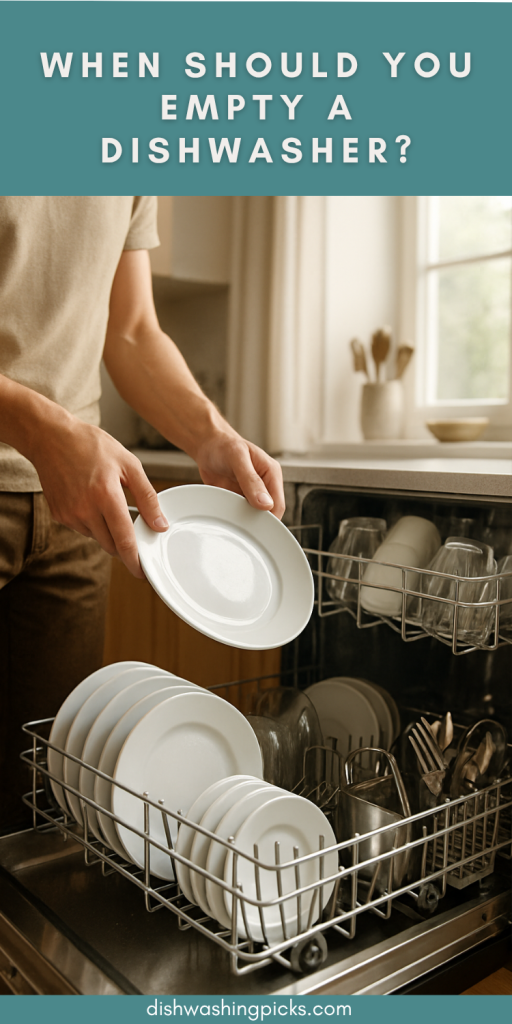
The Dishwasher Dilemma Nobody Talks About
Okay, let’s be honest for a second. We’ve all done it—opened the dishwasher, peeked inside, and thought, “Eh, I’ll unload it later.” And then… later becomes tomorrow, or two days from now, and suddenly you’re pulling forks out of the bottom rack like a raccoon digging through a recycling bin.
But here’s the thing: when you empty your dishwasher actually matters—for your dishes, your sanity, and even your kitchen’s flow.
So, when should you do it?
Let’s break it down with a dose of real-life logic, a sprinkle of science, and maybe a gentle nudge toward building habits that’ll make your future self say, “Wow, look at me being so put-together.”
As Soon As It’s Done? Here’s Why That’s a Game-Changer
Picture this: the dishwasher finishes its cycle, steam is still curling out as you crack open the door, and—boom—you empty it right then and there.
Is this overachiever behavior? Maybe.
But hear me out: there are some legit reasons to do it immediately after the cycle ends:
- No lingering moisture = less odor. Leaving your dishwasher closed traps steam, which can lead to musty smells (gross).
- You’re less likely to forget. If you wait, that “just cleaned” load becomes that “oh no, I needed a spoon and now everything’s wet and lukewarm” load.
- It resets the kitchen. Think of it like making your bed in the morning. A small win that sets the tone for the rest of your day.
Quick Tip: If you don’t have time to unload immediately, at least crack the door open to let the steam out. Your dishes (and nose) will thank you.
Morning vs. Evening: When’s the “Right” Time?
Some folks swear by unloading in the morning—maybe while the coffee’s brewing or breakfast is popping in the toaster. It becomes part of the routine. Kind of like brushing your teeth, but with slightly more risk of breaking a wine glass.
Others prefer doing it after dinner, when the kitchen’s winding down and the day’s chaos is over.
So… what’s better?
Honestly? Whatever works for your rhythm. The goal isn’t to hit some magical dishwasher timing window—it’s to make it habitual. The more it becomes part of your routine, the less mental effort it takes.
Try this: For one week, experiment. Unload in the morning for a few days, then switch to evenings. Notice what feels easiest. Stick with that.
When You Shouldn’t Wait Too Long
Alright, this part’s important: while it’s okay to wait a little bit, waiting too long can backfire.
Here’s what can go wrong:
- Water spots start to form. Especially if your dishwasher doesn’t have a great drying system. (Looking at you, budget models.)
- Trapped moisture = bacteria playground. If you’re sealing that steam in for hours, it’s like a tropical vacation for germs.
- You forget what’s clean vs. dirty. Then someone accidentally tosses a crusty spatula into the “clean” load and, well… now you’re rewashing everything.
If you’ve ever found yourself doing a “sniff test” to check if the load is clean, it’s probably been too long.
Mental Load Hack: Use It, Empty It, Reset
Let’s talk real life for a sec.
When the dishwasher is full of clean dishes and hasn’t been emptied yet, it jams up your whole system. Dirty dishes pile up in the sink. You feel guilty every time you walk past. And suddenly that 5-minute chore feels like a 30-minute commitment.
Sound familiar?
That’s why the golden rule in many organized households is:
Empty it before it becomes a bottleneck.
Try thinking of your dishwasher like your inbox. If you never clear it out, you can’t send or receive anything. But if you stay on top of it—even just a little each day—you feel oddly in control. Like a domestic wizard.
Pro Move: Make It a Tag-Team Task
If you live with other people (roommates, partner, kids), this doesn’t have to fall entirely on your shoulders.
- Assign unloading to someone who isn’t on dinner duty.
- Or make it a group hustle—5 minutes of all-hands-on-deck.
- Even kids as young as 6 or 7 can help with silverware and Tupperware lids.
The goal isn’t perfection. It’s teamwork. And fewer sink avalanches.
Just Build the Habit (Not Guilt)
Here’s the truth: there’s no one perfect time to empty your dishwasher. But there is a right time for you—and that’s the one that doesn’t add stress, doesn’t get forgotten, and doesn’t leave you with soggy bowls at 11 p.m.
So whether you’re an early bird unloader or a night owl stacker, the key is consistency. Make it part of your routine, and suddenly it stops feeling like a chore and starts feeling like just something you do—like tossing your keys in the same bowl every day.
Try this today: Next time your dishwasher finishes a cycle, time how long it actually takes to unload. You’ll be surprised—it’s usually under 5 minutes. Set a timer, do it once, and watch how it changes the way your kitchen runs.
